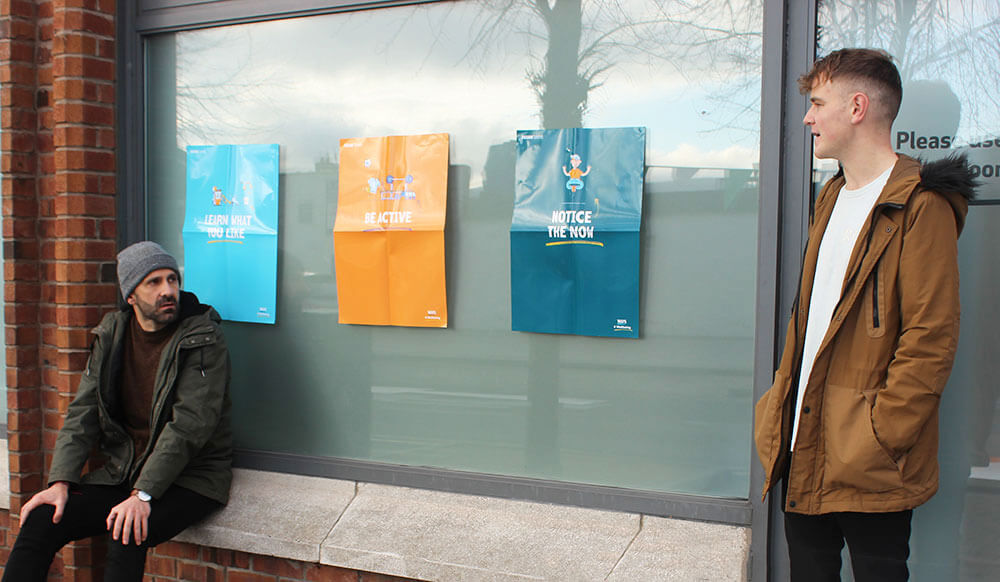Anxiety and young people
Anxiety and young people
Saturday, 30 October 2021
Anxiety is an uncomfortable feeling of fear or stress. It’s quite a common feeling we all experience at some stage.
Many young people accessing Jigsaw face-to-face services report feelings of anxiety as one of the things going on for them.
In this article, you will find:
- What causes anxiety in young people
- Signs of anxiety
- How you can support a young person experiencing anxiety
What causes anxiety in young people?
Young people can internalise messages from their peers, family, and society of looking, being, or behaving a certain way. When these messages don’t fit how they feel or what their life is like, it can cause feelings of anxiety.
Young people will go through many transitions in their lives bound to make them anxious. This could be starting new schools, college, or jobs. Exams, changing peer groups or increasing independence are also experiences that can cause worry. It can be a combination of different factors, with the exact cause of anxiety not clear.
Sometimes it’s more useful to try managing anxiety, or supporting a young person, than figuring out where it came from. It can be difficult as a parent to see your child upset or distressed. But try to gauge what they can tolerate.
You want them to gradually build up their ability to experience anxiety, but manage it well enough. Recognising anxiety as being a part of a new or challenging situation and learning to overcome those feelings is important.
When is anxiety getting in the way?
Anxiety might be short lived, or persist for a long time. If it is preventing a young person doing the things they enjoy, then they may need some support from you.

Trying to take the fear out
Sometimes by trying to take the fear out of something we can minimise what is going on.
Signs of anxiety
Taken on their own, individual signs of anxiety are things we all experience from time-to-time.
What to look out for:
- Irritable, argumentative or frequently in a bad mood
- worried/constantly feel something bad will happen
- often asks unnecessary questions or requires constant reassurance
- gets upset with mistakes, or with a change of routine
- perfectionism or difficulty concentrating
- restlessness, trembling, shaking
- feeling sick: nausea, vomiting, diarrhoea.
If you notice any of these in a young person it’s time to start a conversation.
Sometimes by trying to take the fear out of something, we can minimise what is going on for them. Saying things like “that’s not a big deal” or “that’s nothing to get so worked up about”, can be unhelpful.
On the other hand, completely agreeing with someone feeling anxious might not be helpful either. For example, “Yes you’re right, you shouldn’t go to school because if something goes wrong you might get very upset”.
What is helpful for a young person is to have a parent acknowledge and understand the difficulty of their situation. Show you realise how real their fear and anxiety is. Support them to face the situation anyway and think about how to manage their anxiety if/when it happens.
How you can support a young person experiencing anxiety
Start a conversation
If they’re willing to talk about their anxieties, let them know you’re there to support them.
Young people sometimes hold onto unhelpful thoughts or unrealistic expectations of themselves. Sometimes letting them talk about what it is going on for them can help them gain perspective.
Check in with how they’re feeling
If you see your son or daughter is experiencing a strong emotion, ask them about it. Try, “You look worried, is there something on your mind?”. Or “It sounds like something has happened, would you like to talk about it?”
Listen carefully, and acknowledge their fears. Try not to diminish or ignore their emotions.
Help identify what is going on
Is there a cause for the anxiety? Can you help work out what is contributing to their sense of worry?
Sometimes working out the issue causing a sense of worry and fear can be useful. Even if it is beyond their control, identifying and naming it can help.
Offer to help with problem solving
Avoid trying to solve their problems for them. Work with them to break down problems into smaller, more manageable steps. Help them identify possible solutions and weigh up which ones might be worth trying.
Reminding young people of times when they’ve dealt well with problems can be encouraging. It can also reinforce their strengths.
Expectation management
Young people can take on expectations of others and feel unable to challenge them. Are there many expectations on this young person at home? Is there a weight of expectation coming at them from their teachers or tutors?
They can also have very high expectations of themselves which are not always realistic. In some cases, unrealistic expectations can be used to be overly self-critical. Tease out what some of the expectations are and where they’re coming from.
Focus on the positive
Young people can get lost in their negative thoughts and self-criticism. Try to help your own young person focus on their positive attributes and the good aspects of a situation.
Some young people learn to avoid the things that make them feel anxious. The habit of avoiding things that make us uncomfortable can cause us to miss out on new experiences.
It’s important for young people to realise a certain amount of anxiety is to be expected. We need to learn to live with it and not always back away from it.
Watch your own anxiety management
Young people pick up on their parent’s emotions. If you’re anxious, your son or daughter could pick up on this. Staying calm in stressful situations and managing your own anxiety can help benefit both of you.





